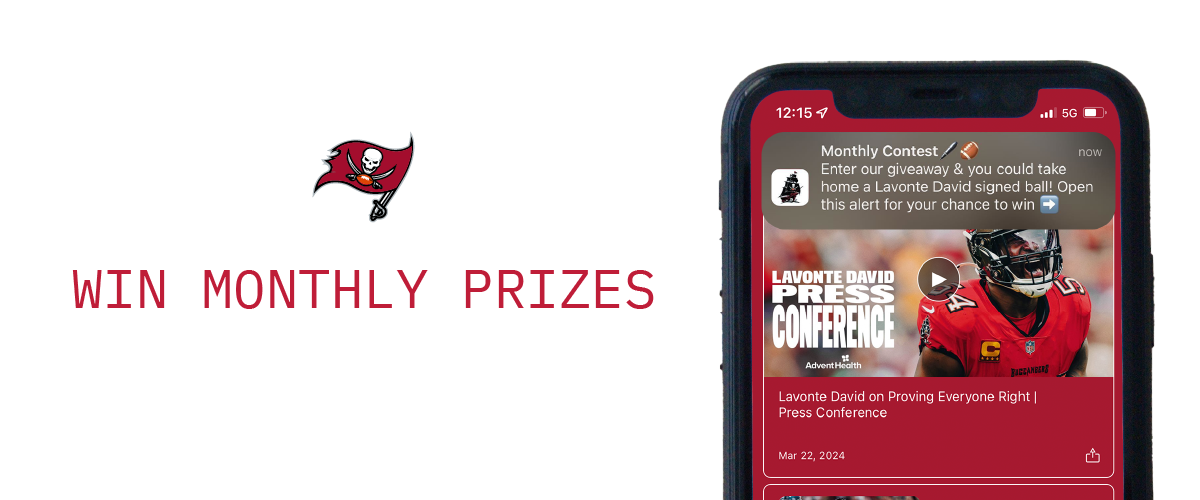The Tampa Bay Buccaneers just missed completing a wild comeback in Atlanta in Week Six, falling 34-29 to drop to 2-3 on the season after a 2-0 start. This is actually the fourth straight season in which the Buccaneers have been 2-3 after five games; they certainly hope this one ends up resembling the 9-7 team of 2016 more than the 5-11 squad from last year.
The Buccaneers have now started 14 seasons with a 2-3 ledger through five games. The first six came during the pre-Glazer era and all ended in losing records. The last seven prior to 2018, however, demonstrate how little we can assume after a lukewarm start of that nature. Here are the final records for the last seven Buccaneer teams to start 2-3 prior to the current squad:
1998: 8-8
1999: 11-5 (playoffs)
2001: 9-7 (playoffs)
2012: 7-9
2015: 6-10
2016: 9-7
2017: 5-11
So everything from five wins to 11 in that spectrum. The last two seasons show just how much the 2018 campaign could diverge from this point, and there's no real secret about the main reason why. In 2016, the Buccaneers were 6-4 in games decided by seven points or less and 3-0 in games decided by three points or less. In 2017, they were 3-7 in the former category and 1-4 in the latter. If the Buccaneers are going to go from their most recent 2-3 start to the playoffs, they're going to need to win a majority of the remaining games that come down to the wire.
Okay, now on to your questions.
A reminder that you can send questions to me anytime you want on Twitter (@ScottSBucs) and they're easier to find if you include the hashtag #SSMailbagBucs. As you'll see from time to time, I also unilaterally appropriate for myself – as any good pirate captain would – questions I like that are meant for our Insider Live show or are simply responses to one of my previous tweets. I've also taken to stealing emails meant for our Salty Dogs podcast. As always, if you specifically want to get a question into the mailbag and would prefer to email your question, you can do so to tbbsocial@buccaneers.nfl.com.
I'm taking that "Rodriguez" to be an auto-correct and Jerald meant to say Rodgers, as in Jacquizz Rodgers. And yes, as Rodgers, Peyton Barber and Ronald Jones are likely to be the three tailbacks active for the Buccaneers on Sunday against Cleveland, the handoffs by definition will be split between the three. Obviously what Jerald wants to know is how the carries will be split.
We don't have a ton of evidence yet to make such predictions, as Jones has only been active for the last two games. But what we have seen makes it pretty clear to me that Barber is not close to being unseated as the primary ballcarrier. Since Jones joined the game-day party in Week Four at Chicago he's had one game with 10 carries and one game with one carry. Most of his totes in the Bears game came in the second half after the Bucs got way down on the scoreboard and the coaches decided to take longer-than-expected looks at such players as Jones, Justin Watson, Vita Vea and – to shake the rust off for his first start two weeks later – Jameis Winston.
Last Sunday in Atlanta, Jones was more involved in the passing game than the rushing attack, carrying just one time for three yards but having three balls thrown his way. He caught all three of those passes, which was encouraging; when Jones arrived in Tampa as a high second-round pick this spring, his receiving game was not yet fully formed, and it still isn't. The Bucs definitely want to throw him the ball in order to get him out in space where he can use his explosiveness.
Meanwhile, Barber had his best game of the season in Atlanta, running 13 times for 82 yards. That included three runs of 10 or more yards, as he was getting some decent holes and running through them decisively. He also contributed four catches for 24 yards, and that's an underrated part of his game. Here's what Head Coach Dirk Koetter thought of Barber's performance in Atlanta:
"Peyton did a nice job yesterday. I mean, he broke tackles, he was explosive, he looked quick. When he got opportunities in the passing game, he did a good job. Overall Peyton played well."
The Bucs as a team cracked 100 rushing yards in a game for the first time this season and averaged 6.2 yards per carry. Given how much trouble they had been having on the ground, one would think they would try to replicate the formula that led to this success. And to me, that says that Barber is still going to get the lion's share of the carries. I would guess Jones would get a handful but not more than five or six unless he proves to have the hot hand.
Rodgers had nine carries in the first three games, for just 13 yards, and hasn't taken a handoff since Jones was added to the active list on game days. Since the Buccaneers are pretty obviously a pass-heavy team, there aren't usually going to be 25 or 30 carries to go around. After Barber and Jones get their shares, there usually won't be much left for Rodgers, though he does still work into the mix on offense and is a very strong pass-blocker and a capable third-down back.
The Browns rank 28th against the run so far this season, giving up 138.2 yards on the ground per game. They're also allowing 4.66 yards per carry and have allowed seven rushing touchdowns. There's a lot of young talent on that defense, however, and they have been the league's best at creating turnovers. If the Buccaneers can get out to an early lead – as they have in their two wins this year – they would benefit from being able to move the ball on the ground and reduce the risk of turnovers. If that happens, there might be a few more carries to go around this weekend, and that could benefit all of the running backs, but I still expect Barber to be the one leading the way.
I get that this tweet is a dig but given the general level of discourse in my Twitter responses the past few weeks, this is actually more civil than most. And it's a valid point. Take the Atlanta game: The defense was legitimately effective in the third quarter, forcing punts on all three Falcons drives and not allowing any plays of more than 15 yards. The Falcons were one for four on third down tries in that period.
Unfortunately, the Buccaneers went into that quarter down by 11 points because the defense had trouble figuring things out in the first half again. As Koetter said on Monday, they continued to have coverage problems and gave up too many "chunk" plays in running out to a 21-6 lead. After the Bucs had cut it to one score just before halftime, the defense disappointingly allowed Matt Ryan to complete three straight medium-range passes in a span of 20 seconds, setting Matt Bryant up for a 45-yard field goal.
As such, when Tampa Bay's prolific offense faltered a bit in that third quarter – turning two drives into the red zone into just three points – it wasn't enough to get out of that first half hole. The Bucs ended up scrambling right down to the end, needing one last desperation play from Atlanta's 20 to win it and not coming through on that low-percentage shot.
"We did play better in the second half," said Koetter. "We came out and got two stops right off the bat. We didn't really stop them at all in the first half. We came out and got those two stops. Had the offense executed better in those first two drives, we could've been gone from 11 down to three up in the first two drives. 'Woulda-coulda-shoulda' doesn't get it done."
The intimation in how LeeAnn's question is worded, and I apologize if I am errantly putting words in her mouth, is that the defense is suffering from a lack of effort in parts of the game. If that's the idea behind the question, then I'll have to disagree with that part of it. Their play hasn't been good enough – that's obvious and it led to a dramatic change in the coaching staff this week – but I have yet to hear Koetter question the effort on either side of the ball.
Anyway, if new Defensive Coordinator Mark Duffner can help affect some real change on the defense, perhaps that is the new thing we'll see: A crew that's on top of its game right from the start and makes plays early could keep the Bucs from falling into another big first-half deficit. We'll get our first chance to see if this happens on Sunday with Duffner now in charge.
What would happen in overtime if one team took the full ten minutes and kicked a field goal just as time was expiring?
Alex Smith (via email to saltydogs@buccaneers.nfl.com)
We got this question for our podcast weeks ago but I always planned to share it here as well as soon as I got the answer. It just took me longer than expected to get that answer.
The scenario that Alex is suggesting would seem to test the league's relatively new overtime rules. The way it works now, the team that gets the first possession in overtime can end it by scoring a touchdown on that possession. As had always been the case in the old "sudden death" days of NFL overtime, the other team would not be afforded a possession to try to match that score.
However, if the team with the first possession kicks a field goal, that's no longer sudden death. The other team is guaranteed a possession to try to match it, or win the game with a touchdown. (To be exact, the second team is guaranteed a "chance" at possessing the ball; if they fumble away the kickoff, they lost their chance.)
But, asks Alex, what if the first team uses all the time available in overtime, which is now only 10 minutes long, then kicks a field goal. This would seem to stress those new rules. They specifically say that the other team should get a possession after the field goal, but there is no time left for them to possess anything. Here's how it reads in the official rulebook:
Rule 16, Article 3.c: "If the team that possesses the ball first scores a field goal on its initial possession, the other team (the second team) shall have the opportunity to possess the ball."
There are a number of subpoints and added notes clarifying various situations, such as what happens on plays that have double changes of possession. But nowhere is there a simple sentence addressing the above question, such as: "If time expires in overtime prior to the second team getting an opportunity at a possession, the game is over and no possession is possible."
If I had found something like that in the rulebook, my search would have been over quickly. Instead, I spent weeks trying to find out. My strategy was to ask people inside the AdventHealth Training Facility who I thought might know the answer. Most people assumed the same thing I did: That the game would be over in such a situation. The problem was, nobody could tell me they officially knew that to be the answer.
Finally, a helping hand on the football staff who I shall keep anonymous volunteered to ask a game official for the answer before the game on Sunday. Apparently there's a lot of chit-chat on the field during warm-ups and officials like being asked questions about the rules. Sure enough, one of them provided the answer without hesitation: The scenario described by Alex is the one way a team can lose an overtime game on a field goal without getting a possession to respond.
It's common sense, yes, but I feel much better knowing that's the actual rule.




































